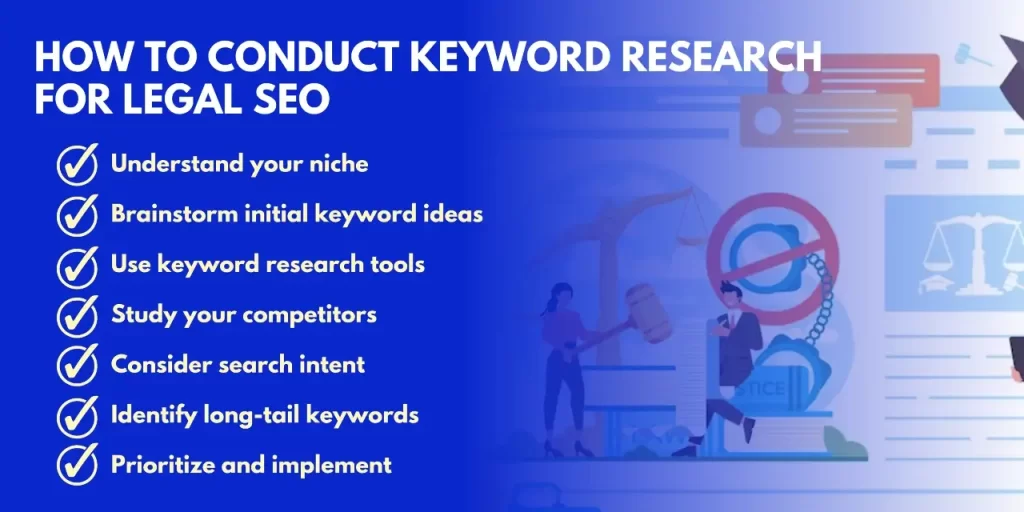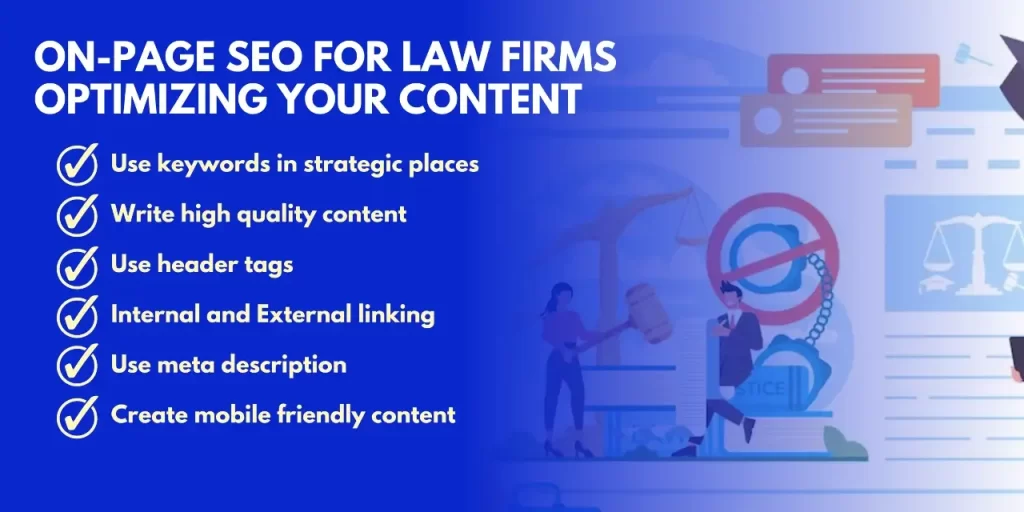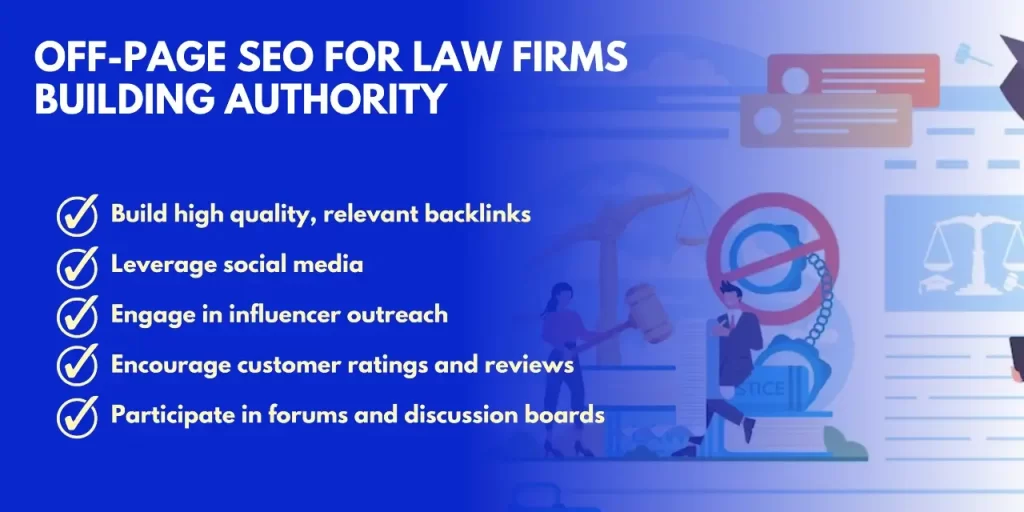Your law firm is up and running; you’re serving clients with the utmost professionalism and expertise, but you’re constantly battling a major issue – online visibility. You’ve read about Law Firm SEO (Search Engine Optimization), but are unsure how it could benefit your firm.
Mastering the intricacies of SEO for law firms can feel like an uphill battle. Yet, for legal professionals, it’s an essential component of any successful marketing strategy. It’s a critical factor that drives traffic to your website and helps you stand out in a saturated market.
In today’s digital era, the art of mastering legal SEO isn’t just about analyzing keywords. It also refers to understanding search intent, building a holistic online presence that appeals to search engines, resonates with potential clients, and positions your firm as an authority in your field.
It’s no secret that local service ads for lawyers are gaining traction, and rightly so. With the proper application of legal SEO strategies, these local ads can prove highly effective in driving your target audience to your legal services.
Understanding The Basics of SEO
At its core, SEO may seem like an industry-specific technical term. However, it involves a straightforward and crucial process. It’s the art and science of optimizing your website to attract organic traffic from search engines.
Giants like Google deploy intricate, ever-evolving algorithms to rank websites, ensuring the most relevant and valuable results are provided to users based on their queries.
The Definition Of SEO
SEO is a type of digital marketing that focuses on a website’s presence in search results on search engines like Google. It involves understanding what people are searching for online, the answers they’re seeking, the words they’re using, and the type of content they wish to consume.
Furthermore, SEO isn’t just about building search engine-friendly websites; it’s about making your site better for people, too.
The Three Pillars Of SEO
Generally, SEO strategies rest on three pillars: relevance, authority, and user experience (UX).
Relevance relates to how well your content answers the searcher’s query. Authority is about being recognized by other reputable websites. This makes your site a reliable source of information among competitors. Lastly, UX is all about your website being user-friendly, easy to navigate, and pleasing to visitors.
The Magic Of Crawlers And Algorithms
Search engines use complex programs called ‘crawlers’ to review and index website content online. These bots look at web pages and follow links on those pages, much like you would if you were browsing content on the web.
Then, search engines use algorithms to analyze the indexed pages. They consider hundreds of ranking factors and signals to determine the order pages should appear in the search results for every given query.
The Essential Components of Law Firm SEO
To create an effective law firm SEO strategy, you need to pay attention to the following components:
Keywords: Identifying and using relevant keywords are crucial to SEO. These may cover the services your firm offers, the geographical locations you cater to, or the answers to common legal questions potential clients might search for.
Website Optimization: An easy-to-navigate and mobile-responsive website is the foundation of any successful SEO campaign. Ensure your website loads swiftly and provides an intuitive UX to encourage visitors to spend more time on your site.
Content: High-quality content is vital to SEO success. It should serve as a valuable resource for your audience, addressing their queries, offering insightful commentary on legal matters, and naturally integrating the appropriate keywords.
Local SEO: Local SEO is particularly valuable for law firms with physical offices. Optimizing your Google My Business profile, encouraging and responding to client reviews, and ensuring your contact details are consistent across all online platforms fall under this umbrella.
Backlinks: Backlinks are hyperlinks from other reputable websites to your own. These are viewed favorably by search engine algorithms, which interpret them as a sign of your website’s credibility and authority.
SEO has become an indispensable tool in a law firm’s digital marketing toolkit. Understanding and effectively employing SEO techniques can significantly enhance a firm’s online visibility, drawing in prospective clients and promoting growth.
Keyword Research: The Foundation of SEO for Law Firms
Keyword research is integral to any SEO strategy for law firms. It helps identify the phrases and terms your prospects might be searching for.
In addition, keyword research is the backbone of an effective SEO strategy. It provides the roadmap to creating relevant content that meets the needs of your potential clients. When done correctly, you’ll be able to increase your website’s visibility and attract more relevant traffic.
Here’s what keyword research can do to improve your law firm’s SEO strategy:
- Enhances Visibility And Rankings
Keyword research plays a crucial role in improving your law firm’s ranking and visibility. If you know the terms people use in their queries, you can tailor your web content to match these searches. This makes it easier for search engines to understand the gist of your content.
- Drives Relevant Traffic
Keyword research isn’t just about driving more traffic to your site; it also ensures you receive the right traffic.
By understanding the keywords your potential clients are searching for, you can attract visitors who are genuinely interested in your legal services. This improves your chances of converting those who visit your site into clients.
- Informs Content Creation
Keyword research can guide your content creation strategy. By using the terms your prospects are searching for, you can create informative content to answer their queries. This not only boosts your SEO but also positions your firm as an authority in your field.
- Gives Competitive Insight
Keyword research also provides valuable insights into your competitors’ strategies. By understanding the keywords your competitors use, you can identify gaps in your own strategy and discover untapped opportunities to increase your visibility.
- Guides PPC Campaigns
If your firm uses pay-per-click (PPC) advertising, keyword research is crucial. The right keywords can make your ads more relevant and improve their rankings. This increases the likelihood of clicks and conversions.
Here’s a Step-by-Step Guide to Conducting Keyword Research for Legal SEO

Now that you understand how vital keyword research is for your law firm SEO strategy, it’s time to learn how to do it.
Step 1: Understand Your Niche
Start by gaining a clear understanding of your industry, clients, and services. What are the main topics that your potential clients would be interested in? For instance, if you’re a personal injury lawyer, your broad topics could include car accidents, workplace injuries, or medical malpractice.
Step 2: Brainstorm Initial Keyword Ideas
Brainstorm potential keywords under each broad topic. Think about what your potential clients might search for related to each topic.
Using the personal injury lawyer example, keywords might include ‘car accident lawyer,’ ‘car accident compensation,’ or ‘car accident claims process.’
Step 3: Use Keyword Research Tools
Next, utilize keyword research tools to refine your list. Enter your keywords to get related suggestions about search volume and competition. This will help you identify which terms are likely to drive the most traffic to your site.
Step 4: Study Your Competitors
Analyzing the keywords your competitors are ranking for can also provide valuable insights. Check their websites and see what terms they use in their content, titles, and meta descriptions. Competitor analysis tools can also help you identify the keywords your competitors are targeting.
Step 5: Consider Search Intent
Search intent refers to the goal a user has when entering a search query. Understanding this can help you tailor your content to meet your users’ needs.
For example, a user searching for ‘how to claim for a car accident’ is likely looking for informational content, while a user searching for a ‘car accident lawyer near me’ is likely looking to hire a lawyer.
Step 6: Identify Long-Tail Keywords
Long-tail keywords are more specific phrases. They may have lower search volumes but higher conversion rates, as they tend to be used by users who are closer to the point of making a decision or a purchase.
Step 7: Prioritize and Implement
Finally, prioritize your keywords based on their relevance to your content, their search volume, and your ability to compete for them. Then, start implementing these keywords naturally into your content, meta descriptions, URLs, and headers.
Remember, keyword research is not a one-and-done task. It should be an ongoing process, as search trends can change over time. By regularly conducting keyword research, you can keep your content relevant and continue to drive targeted traffic to your site.
On-Page SEO for Law Firms: Optimizing Your Content

On-page SEO is the process of optimizing web pages to rank high in search engine results pages (SERPs) and attract relevant traffic. This involves both the content of a page and the underlying HTML source code.
Here’s how you can optimize your content for on-page SEO:
- Use Keywords In Strategic Places
Place your chosen keywords strategically within your content. You may include them in the title of your page, URL, meta description, and content body.
Aim for a keyword density of around 1 – 2%, meaning your keyword should appear once or twice for every 100 words.
- Write High-Quality Content
Search engines prioritize high-quality, user-friendly, and helpful content. Make sure yours is well-written, informative, and engaging and offers value to readers. Aim to create content that’s better than what’s currently ranking for your chosen keyword.
- Use Header Tags
Use header tags (H1, H2, H3, etc.) to structure your content so it’s easier to read. Your primary keyword should be in your H1, which should be the title of your page. On the other hand, subheadings (H2, H3, and so on) should contain relevant secondary and long-tail keywords.
- Internal and External Linking
Include internal links to other pages across your site. This helps search engines understand the context and relationship between different pages.
Aside from that, make sure to link to reputable external websites whenever necessary. This helps search engines validate your content, improving your site’s authority.
- Use Meta Descriptions
Meta descriptions are the brief descriptions that appear under your page title in SERPs. They should be concise and compelling and include your primary keyword. While they don’t directly impact rankings, they can improve your click-through rate.
- Create Mobile-Friendly Content
With an increasing number of people browsing the web on mobile devices, it’s crucial that your content is mobile-friendly. Ensure your website has a responsive design that adapts to different screen sizes.
On-page SEO is a critical component of your SEO strategy. By optimizing your content for on-page SEO, you can improve your website’s visibility, drive more traffic, and, ultimately, attract more potential clients.
Off-Page SEO for Law Firms: Building Authority

While on-page SEO optimizes elements within your website, off-page SEO refers to the actions taken outside your site that impact your search engine rankings. These include factors like backlinks from other websites, social media marketing, and reputation management.
Here’s how you can optimize your content for your off-page SEO strategy:
- Build High-Quality, Relevant Backlinks
Backlinks are probably the most influential factor in off-page SEO. When other reputable websites link to your website, search engines see this as a sign of reliability, significantly improving your rankings.
However, not all backlinks are created equal. Links from high-authority websites in your field are far more beneficial than those from low-quality sites.
There are several ways to earn relevant backlinks. These include creating valuable, shareable content, guest posting on reputable websites in your field, and forming partnerships with influencers and other businesses.
- Leverage Social Media
Although there’s an ongoing debate about the direct impact of social media on SEO rankings, there’s no doubt that a strong presence on social media can help increase your online visibility. Regularly sharing your content on social media platforms can generate more traffic to your site and increase the chances of others linking to it.
- Engage in Influencer Outreach
Influencer outreach involves connecting with influencers in your field and asking them to share your content. If an influencer shares your content, not only will their followers see it, but you may also earn a backlink, which can help boost your SEO.
- Encourage Customer Reviews and Ratings
Online reviews and ratings on sites like Google and Yelp play a critical role in your online reputation and can indirectly influence your SEO. Always encourage satisfied clients to leave positive reviews. And remember to respond professionally to any negative reviews.
- Participate in Forums and Discussion Boards
Participation in online forums and discussion boards related to your field can also boost your off-page SEO. By providing helpful answers and insights, you can establish yourself as an authority and include a link back to your site when relevant and appropriate.
Remember, off-page SEO focuses on building trust and authority for your website. It’s a long-term, ongoing process that requires consistent effort, but the benefits to your website’s visibility and rankings are worth it.
Final Words
Mastering law firm SEO strategies as a legal professional doesn’t need to be daunting or confusing. Implement these strategies, and you’ll be well on your way to improving your firm’s online visibility, attracting potential clients, and establishing its presence in the digital world.
Keep in mind that SEO is a marathon, not a sprint. Invest your time wisely, and the rewards will follow.